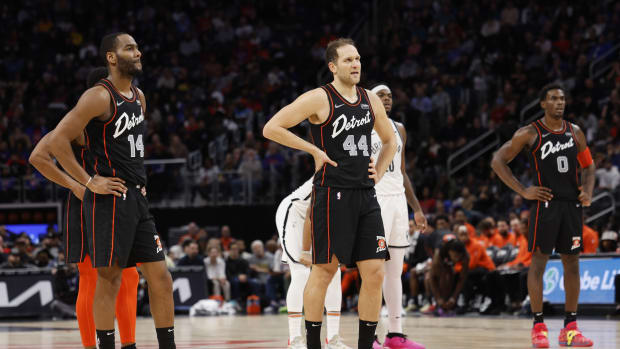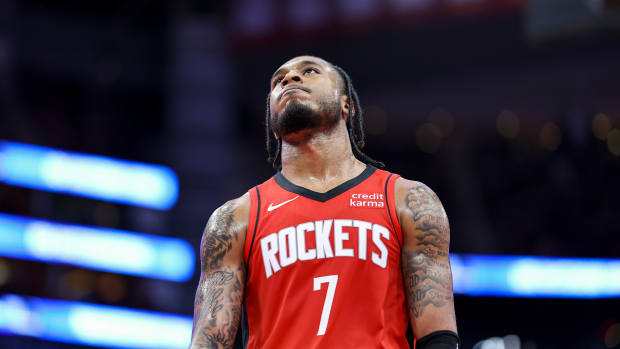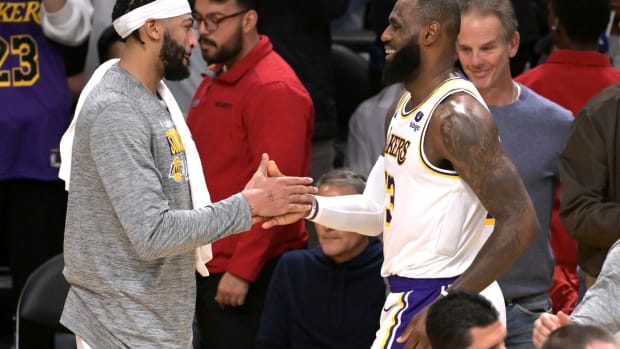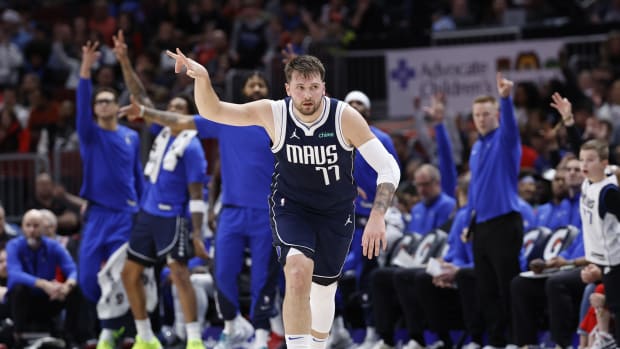The Celtics' Loss Is NBA Free Agency's Gain
The NBA is the sort of league where nothing can be taken for granted, least of all the very credible threat of a player exercising his free agency. Too much can depend on any one player and on any one point in time. Should even a single element fall out of place, the integrity of the roster could go with it. And should two stars position themselves to leave at the same time—as appears to be the case in Boston—then even the best-laid plans can fall apart.
It wasn’t a year ago that the Celtics were the envy of the league: a dual-track team built to contend in the Eastern Conference while grooming two of the more promising young wings in the league. Then came struggles on the court and fissures in the locker room—the chicken-and-egg essence of a discontent team. Kyrie Irving began the season by announcing to Celtics’ season-ticket holders his intention to re-sign, “if you guys will have me back.” In the past month, Irving has reportedly gone quiet on the team while making his way towards the exit. It seems only a matter of time before Irving’s Celtics career finds its official end.
To make matters worse, Al Horford—the player most crucial to Boston’s night-to-night success—will join Irving on the open market. For Horford to decline his $38 million player option for next season wasn’t entirely unexpected; it had long been supposed that Horford might exit his contract early for the purpose of signing a longer-term deal to stay with the Celtics. Even the reporting in the moment of Horford’s decision was framed to that possibility, up until the moment the two sides found themselves at odds in negotiations. As of Tuesday, Horford was expected to sign a four-year contract to play for another team, per Steve Bulpett of the Boston Herald.
Might this be a negotiation tactic? The creation of a public market for Horford certainly applies pressure to the Celtics, though it should also present the star center with more-than-palatable alternatives. If Boston’s offer gets close enough to Horford’s number to facilitate a return, so be it. More likely, at this point, is the departure of a player highly regarded and available at the perfect time. Any team that signed Horford would look to be competitive immediately. Injuries to Golden State’s Kevin Durant and Klay Thompson, unfortunate as they were, facilitate the notion. There is no longer one, definitive franchise towering over the Western Conference, which should motivate a number of Horford’s suitors. There is also no guaranteed power in the East, given that the Raptors—even as newly crowned champions—will soon contend with the free agency of Kawhi Leonard. Beyond Toronto, three of Milwaukee’s starters will be up for grabs. All three of Jimmy Butler, Tobias Harris, and JJ Redick could conceivably leave the Sixers.
Uncertainty around the league has created a void. For those teams who would aim to fill it, Horford would be a terrific source of ballast: a facilitator to help break playoff defenses, a pillar of any scheme, and a stabilizing force in the locker room. The primary concern with Horford is how his game might regress by the third and fourth years of a potential deal, but the opportunity at hand makes him worth the investment, with the added benefit of compromising another contender. Without Irving, the Celtics could still be one of the best defensive clubs in the league. Without Horford, they’re just another team.
In the event that both leave, Boston would be desperate for playmaking. Marcus Smart can run an offense to a certain competence and Gordon Hayward makes for a fine facilitator, but Irving and Horford accounted for most of the Celtics’ troubleshooting. When possessions didn’t go as planned, it paid to have a big who could redirect the action and a guard who could pull decent shots from difficult situations. So much of that responsibility will soon fall to Jayson Tatum and Jaylen Brown—a world apart from the way a crowded Boston offense squeezed their roles last season. The virtue of the way the Celtics were built was that neither Tatum nor Brown would have to do too much too soon.
How quickly things change. In the event that both Irving and Horford leave, Boston could have over $30 million in cap space to work with, pending the decisions of Marcus Morris and Terry Rozier. None of this year’s top free agents seem especially keen to sign there, and what muted interest there was would dampen with a roster that is appreciably worse. It seems the appeal of playing with Irving may be greater than the appeal of playing for the Celtics. When he drifted from the franchise, he took with him both the stability of the present and the most direct means for upward mobility. There was no trading for Anthony Davis without Irving around to convince him to stay. There is no superstar addition in the works without the pitch Irving makes implicitly.
One NBA player can have an extraordinary impact—greater than that of any individual in any other major sport. One reality of the league, then, is dealing with the craters they leave behind. Were Irving committed to stay, Horford might be, too. The Celtics would be going into this week’s draft with three first-round picks to advance the pursuits of a talented team. Instead, those same picks mark the end of an era as the final draft considerations of Boston’s 2013 trade with Brooklyn—the assets that set all of this in motion and the last remnants of a dream. Front offices project out years in advance, fret over the smallest details, and fight to keep even improbable options open. They do this because every team is built precariously. Every roster is on the brink. The only question is how much a team can get done before it all falls apart.


































